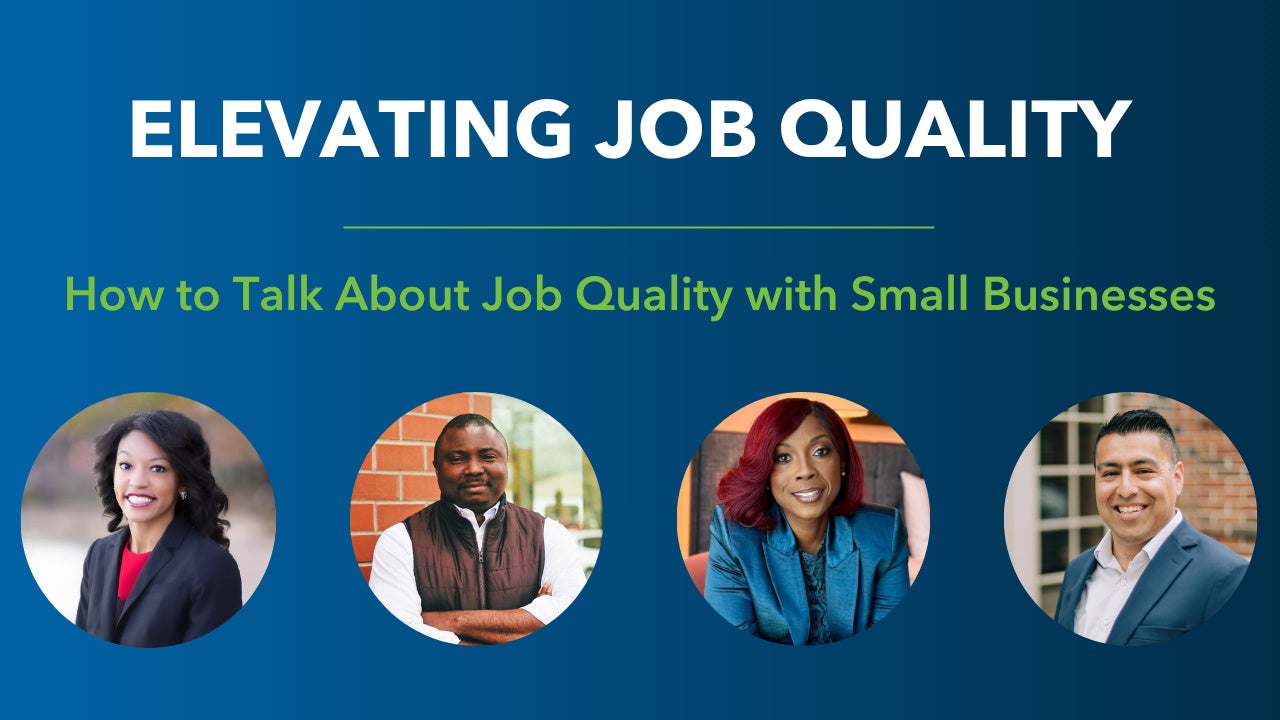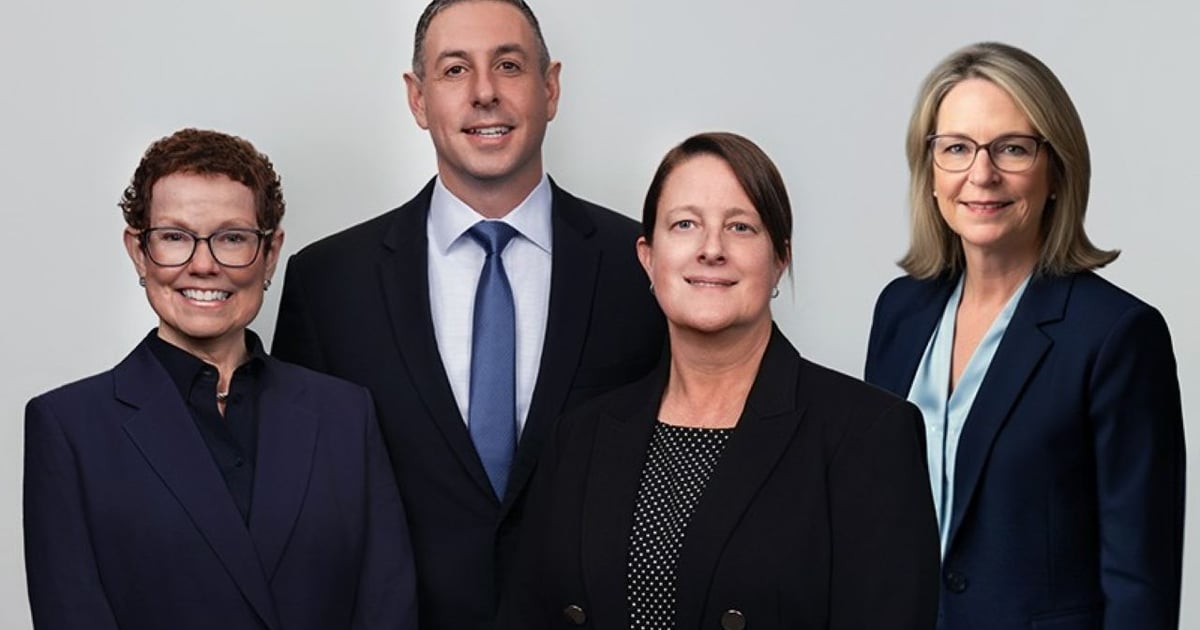How to Talk About Job Quality with Small Businesses


Doing job quality work requires CDFI business advisors to broaden the conversations they have with business owners to include topics related to human resources (HR), employee management, and business operations and strategy.
Lauren Starks, Director of Good Companies/Good Jobs at the Economic Opportunities Program, recently sat down with three Shared Success grantees—Tabin Tangila Mesu Kamba, Program Developer, Workforce Solutions at Coastal Enterprises, Inc., Dionne McGee, Consultant at Institute Capital, and Israel Flores, Business Services Director at Northern Initiatives—to discuss how their CDFIs advise small businesses on how investing in employees can allow for increased productivity and innovation, as well as business stabilization or growth.
This interview has been edited for length and clarity. Listen to the full podcast interview here.
Lauren Starks: Thank you all for joining me today. Tabin, can you tell us about your work at Coastal Enterprises, Inc. and how you are broadening conversations with small businesses about job quality?
Tabin Tangila: At CEI, we help businesses create good jobs and job quality. When they come to us, we ask them to invest back in their communities by hiring folks who face barriers to employment. A variety of businesses come to CEI- many are single-person startups. For those businesses without their first employee, we also help them create job descriptions and job postings, and develop job quality and human resources policies and practices, such as paying a living wage with time off and retirement savings plans.
Those are wonderful insights and the way you describe how job quality is woven into HR or business operations. Can you share more about the connection between job quality and advancing bottom-line outcomes?
TT: Job quality has so many benefits for businesses. Businesses that provide quality jobs to employees have more engaged and motivated employees, which leads to greater retention. Customers being served by engaged and motivated employees receive a better customer experience, helping the business grow. We want small businesses to see that investing in your employees is an investment. When you pay for training, they get skills. When you pay them well, they feel valued and respected, and as a result, it’s better for the bottom line.
Israel, staying with this theme of a holistic and expanding conversation around what job quality can do to improve business outcomes and also improve opportunities for workers and the communities that they’re in, can you tell us about how Northern Initiatives approaches job quality in conversations with small businesses?
Israel Flores: As the Business Services Director for Northern Initiatives, I oversee all the business coaches. One of the things that allowed us to be successful in delivering job quality advice is that we embrace job quality internally. We see the value in how job quality helps businesses, employees, the economy broadly, and the local economy where you are hiring your neighbors. I don’t think many people think of that.
At Northern Initiatives, when we evaluate a business, often they don’t know if they can afford to pay a little more or provide other benefits or services to their employees. We use a Business Strengths Score where it determines how the businesses are doing meaning, you know, financially, what systems they use, and all of that. We have modified it to include the job quality piece like how many employees do you have, do you pay minimum wage? We have adjusted all of our tools to make sure that we are delivering the job quality advice to the small businesses we work with.
Dionne, tell us about your work at Institute Capital and how you all approach job quality.
Dionne McGee: Institute Capital, or ICAP, focuses on policy, education, and economic development, regardless of race, creed, or color. We provide funding for small business owners who are trying to stimulate the economy, so that looks like a different strategy and different mindset from what one could get from a conglomerate.
A lot of small businesses are not prepared for funding or lending and putting a business plan together, and it can be intimidating, but if you can work with an organization that’s in your local community that understands who you are, the fabric of your business, and what you’re trying to do, it allows you to relax a little bit. ICAP’s focus is to help those who are in the community and surrounding areas that are really trying to fund businesses to get them to where they’re supposed to be and cut that red tape.
Can you each talk about your approach to engagement and building resources and tools for the businesses you work with?
TT: At CEI, we have found that providing one-on-one advising to businesses is really effective. It’s an opportunity for CEI to develop that personal relationship with businesses and build the necessary trust. We’ve also created tremendous content for businesses. When we do an assessment of a business, we try to figure out what they need. For example, if somebody just created a business and needs to hire somebody, what comes to their mind is how to create the job description, job posting, or performance evaluation forms. We create those templates to be customized by businesses as needed. Entrepreneurs can find information on our website at a convenient time for them, and we also make ourselves available for virtual meetings after business hours because we know they are busy during the day. As you know across the nation, 60 percent of people working are employed by small businesses. So this just speaks to why it is important to have an online presence that can reach so many people that we may not reach in person.
As you describe, meeting businesses where they are, and meeting entrepreneurs where they are in this work is such an important strategy and an authentic way to build resources.
IF: Similarly for us at Northern Initiatives, we call it blended learning: one-on-one coaching and our portal called Initiate that some other CDFIs are licensing from us.
We’ve also developed some tools and calculators, especially with the job quality piece, which our customers can use.
The one-on-one relationship that we have to create with our customers is, of course, the best way to engage with our community members and business owners. We call ourselves coaches, not advisors. When we bring resources to a business owner, we don’t tell them what to do. We put everything on the table and they pick whatever they believe is best for their business. They know their business better than we do.
DM: Very similarly, when we design programs and cohorts and incubators at Institute Capital, we think with the client in mind. We are in a technical era and we have to use technology, including virtual meetings and virtual platforms. We do one-on-one business advisory because there are some things that entrepreneurs won’t want to say in a group of people. During those sessions, we get to know you and build that relationship. We also use a learning management system platform, so the courses and webinars are online and you can do it at your own pace, take notes, and implement your learning in real time, à la carte.
I am grateful that we have thoughtful leaders like you three in this work. Thank you for the important and valuable conversation today.
The Shared Success Demonstration is managed by the Aspen Institute’s Economic Opportunities Program and supported by a four-year investment from the Gates Foundation. See as.pn/sharedsuccess to learn more. Views expressed here are based on the implementation, experience, and findings of the Shared Success demonstration, and do not necessarily reflect positions or policies of the foundation.
About Shared Success
Shared Success, a project of the Economic Opportunities Program, works with community lenders to integrate job quality programming into their small business support services, demonstrating that improved job quality can support the needs of employees while helping small businesses succeed.
About the Economic Opportunities Program
The Aspen Institute Economic Opportunities Program hosts a variety of discussions to advance strategies, policies, and ideas to help low- and moderate-income people thrive in a changing economy. To learn about upcoming events and webinars, join our mailing list and follow us on social media.

Abe Student LoansBefore applying for a private student loan, DR Bank and Monogram LLC recommend exhausting all financial aid alternatives...

Warren-Fantano Wealth Management, a team managing over $1 billion in client assets, has joined Janney Montgomery Scott LLC and will...

If your bills feel unmanageable, you aren’t alone. Recent reports found that 30% of people are less able to afford bills today than they...